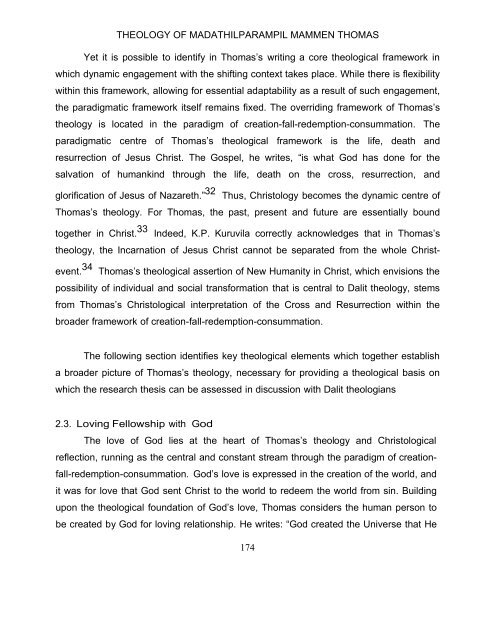MM Thomas - Life, Legacy and Theology
Create successful ePaper yourself
Turn your PDF publications into a flip-book with our unique Google optimized e-Paper software.
THEOLOGY OF MADATHILPARAMPIL MA<strong>MM</strong>EN THOMAS<br />
Yet it is possible to identify in <strong>Thomas</strong>’s writing a core theological framework in<br />
which dynamic engagement with the shifting context takes place. While there is flexibility<br />
within this framework, allowing for essential adaptability as a result of such engagement,<br />
the paradigmatic framework itself remains fixed. The overriding framework of <strong>Thomas</strong>’s<br />
theology is located in the paradigm of creation-fall-redemption-consummation. The<br />
paradigmatic centre of <strong>Thomas</strong>’s theological framework is the life, death <strong>and</strong><br />
resurrection of Jesus Christ. The Gospel, he writes, “is what God has done for the<br />
salvation of humankind through the life, death on the cross, resurrection, <strong>and</strong><br />
glorification of Jesus of Nazareth.” 32 Thus, Christology becomes the dynamic centre of<br />
<strong>Thomas</strong>’s theology. For <strong>Thomas</strong>, the past, present <strong>and</strong> future are essentially bound<br />
together in Christ. 33 Indeed, K.P. Kuruvila correctly acknowledges that in <strong>Thomas</strong>’s<br />
theology, the Incarnation of Jesus Christ cannot be separated from the whole Christevent.<br />
34 <strong>Thomas</strong>’s theological assertion of New Humanity in Christ, which envisions the<br />
possibility of individual <strong>and</strong> social transformation that is central to Dalit theology, stems<br />
from <strong>Thomas</strong>’s Christological interpretation of the Cross <strong>and</strong> Resurrection within the<br />
broader framework of creation-fall-redemption-consummation.<br />
The following section identifies key theological elements which together establish<br />
a broader picture of <strong>Thomas</strong>’s theology, necessary for providing a theological basis on<br />
which the research thesis can be assessed in discussion with Dalit theologians<br />
2.3. Loving Fellowship with God<br />
The love of God lies at the heart of <strong>Thomas</strong>’s theology <strong>and</strong> Christological<br />
reflection, running as the central <strong>and</strong> constant stream through the paradigm of creationfall-redemption-consummation.<br />
God’s love is expressed in the creation of the world, <strong>and</strong><br />
it was for love that God sent Christ to the world to redeem the world from sin. Building<br />
upon the theological foundation of God’s love, <strong>Thomas</strong> considers the human person to<br />
be created by God for loving relationship. He writes: “God created the Universe that He<br />
174


















